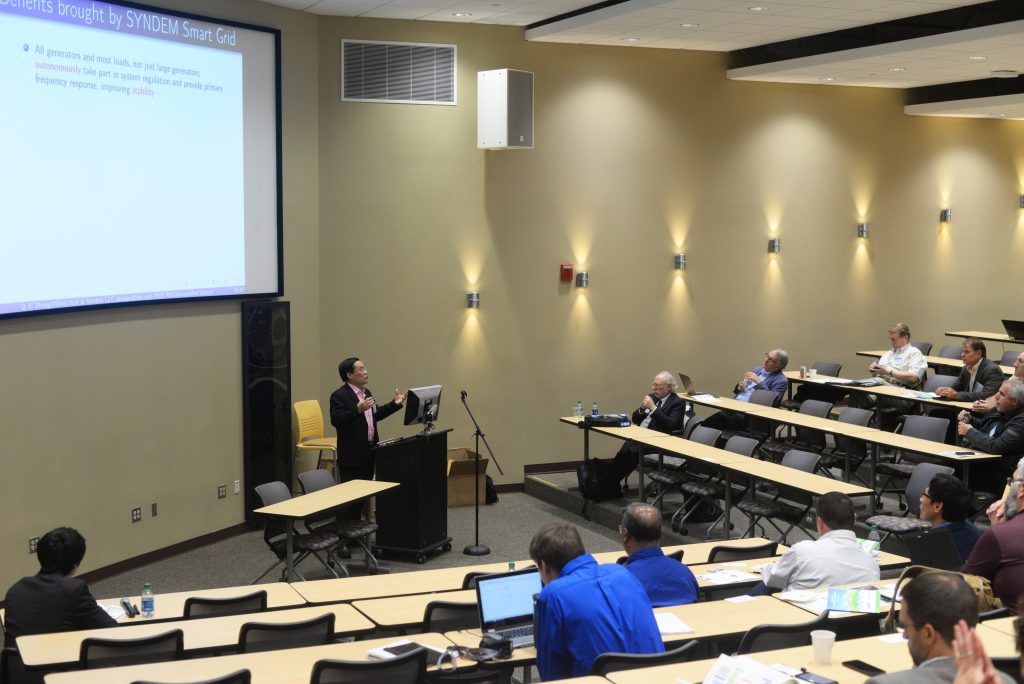For the first time, the Innovation Technologies Complex (ITC) opened it doors to host the Southern Tier Technology Symposium on Thursday.
The symposium was organized by a committee led by Ziang “John” Zhang, an assistant professor of electrical and computer engineering at Binghamton University, and was sponsored by companies including The Raymond Corporation and the Institute of Electrical and Electronics Engineers. The symposium featured poster presentations and speeches on technological and smart energy advancements from industry leaders in New York’s Southern Tier region and invited students to network with professionals.
Spanning throughout the three buildings of the ITC, the event started with registration at the rotunda, located in the Engineering and Science building. In the Symposium Hall of the Center of Excellence building, BU President Harvey Stenger delivered his welcoming remarks and applauded the event.
“I’m also really impressed by the scope of the talks that are going on today,” Stenger said. ”The keynote speakers from different industries. The people are from the local industries as well as a distance away. From materials handling to power grid management, even aviation is being covered today.”
Stenger also highlighted the new technological industries the University has introduced to the area.
“A hundred and fifty years ago, Binghamton was a cigar manufacturing hub,” Stenger said. “Now it’s more of a high-tech incubator hub. We had Endicott and Johnson [City] shoes, but now we have pharmaceutical sciences. In the west[ern district], we were making circuit boards and now we’re making batteries. It’s an exciting time for Binghamton.“
After Stenger’s speech, the symposium officially commenced. The agenda was full of speeches, including keynote presenters like Steven Medwin, ‘05, former director of energy solutions at The Raymond Corporation, and M. Stanley Whittingham, a distinguished professor of chemistry and materials science and engineering and a 2019 Nobel Laureate in Chemistry.
Rather than talking about his time at The Raymond Corporation, Medwin said he wanted to present engineering and new technology questions through an unorthodox lens.
“Not the equations and the technical details, but what’s the consequences of these innovations?” Medwin said. ”How does technology impact society and what is the engineer’s responsibility when their innovation is launched? What if the technology falls in the wrong hands? What’s our responsibility as engineers and scientists? What if a mistake is made? Who is at fault?”
In addition to the speeches, industry professionals tabled with poster presentations to represent their companies, including Horizon Solutions, a Rochester-based electrical automation distributor which recently opened a branch in Binghamton.
The symposium also attracted large corporations such as Eaton, a multinational power management company. Representing Eaton was Bob Hawthorne, ‘93, an operational excellence manager at the company, who said seeing BU again was one of the reasons why he attended the symposium.
“The opportunity to come back to Binghamton and see what’s happened in the 26 years since I graduated was neat,” Hawthorne said. “The fact that we were involved in a lot of high technology, a lot of electronics. We also wanted to see what was going on in the industry and what other companies were doing in the field. Who knows, maybe meet a student or two that will help us in the future.”
Hawthorne said he was excited about BU’s recent successes.
“To see Binghamton University continue to move up in the rankings,” Hawthorne said. ”The president just mentioned two number one rankings. That’s fabulous. I love to see the University getting recognition. To now having a Nobel Prize Laureate to come out of Binghamton University, I think it’s outstanding.”



